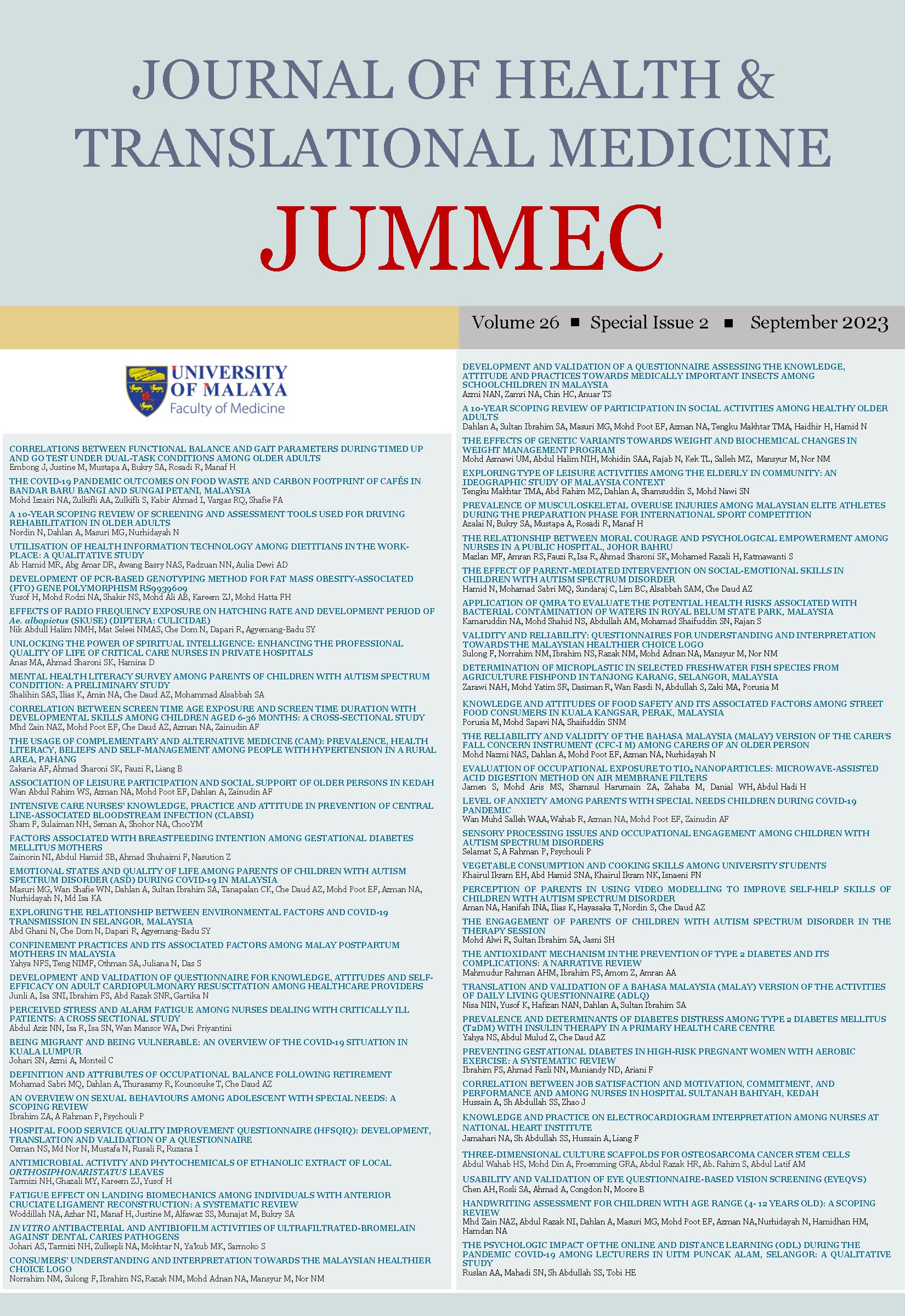TRANSLATION AND VALIDATION OF A BAHASA MALAYSIA (MALAY) VERSION OF THE ACTIVITIES OF DAILY LIVING QUESTIONNAIRE (ADLQ)
Received 2023-07-12; Accepted 2023-09-20; Published 2023-09-21
DOI:
https://doi.org/10.22452/jummec.sp2023no2.46Abstract
The ability to perform activities of daily living (ADL) and instrumental activities of daily living (IADL) can indicate the
functional status of elderly individuals with dementia. The Activities of Daily Living Questionnaire (ADLQ) is a widely
used informant-based assessment tool for measuring functional abilities in individuals with dementia. However,
the original ADLQ is in English and not applicable to the Bahasa Malaysia language. This study aimed to translate
and validate the ADLQ into Bahasa Malaysia to address this gap of knowledge.
The study conducted a cross-sectional study among primary caregivers of elderly individuals with dementia. Forward and backward translations were used to translate the ADLQ into Bahasa Malaysia. The validity of the translated ADLQ was evaluated through face and content validity, concurrent and convergent validity, and test-retest reliability.
The Bahasa Malaysia version of the ADLQ achieved excellent agreement in both face and content validity, with
an average Face Validity Index (FVI) score of 0.95 and an average Content Validity Index (CVI) score of 0.94. The
Modified Kappa (k*) agreement for the translated ADLQ was 0.93, indicating substantial agreement between the
translators. Concurrent validity was established through a strong correlation between the original English version
and the translated ADLQ for the total score (r = 0.93, p < 0.05), total percentage (r = 0.94, p < 0.05), and total points
(r = 0.84, p < 0.05). Convergent validity was established through a strong correlation between the ADLQ-BM and
the Bristol Activities of Daily Living Scale (BADLS) (r = 0.85, p < 0.05). Finally, the test-retest reliability achieved very
strong correlations for the total score (r = 0.94, p < 0.05) and total percentage (r = 0.95, p < 0.05), and a strong
correlation for the total points (r = 0.88, p < 0.05).
In conclusion, the Bahasa Malaysia version of the ADLQ is a valid and reliable assessment tool for measuring functional abilities among elderly individuals with dementia. The excellent agreement in the face and content validity and the strong correlation in concurrent and convergent validity indicate that the translated ADLQ is a robust tool for assessing functional abilities in elderly individuals with dementia in Malaysia. The findings of this study can provide valuable information for clinicians and researchers in Malaysia who wish to evaluate the functional abilities of elderly individuals with dementia.
Downloads
Downloads
Published
Issue
Section
License
All authors agree that the article, if editorially accepted for publication, shall be licensed under the Creative Commons Attribution License 4.0 to allow others to freely access, copy and use research provided the author is correctly attributed, unless otherwise stated. All articles are available online without charge or other barriers to access. However, anyone wishing to reproduce large quantities of an article (250+) should inform the publisher. Any opinion expressed in the articles are those of the authors and do not reflect that of the University of Malaya, 50603 Kuala Lumpur, Malaysia.


